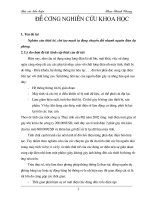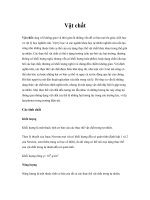Tài liệu Special Delivery doc
Bạn đang xem bản rút gọn của tài liệu. Xem và tải ngay bản đầy đủ của tài liệu tại đây (315.46 KB, 26 trang )
Special Delivery
Knight, Damon Francis
Published: 1954
Categorie(s): Fiction, Science Fiction, Short Stories
Source: />1
Also available on Feedbooks for Knight:
• The Worshippers (1953)
Copyright: Please read the legal notice included in this e-book and/or
check the copyright status in your country.
Note: This book is brought to you by Feedbooks
Strictly for personal use, do not use this file for commercial purposes.
2
Transcriber's Note:
This etext was produced from Galaxy Science Fiction April 1954. Ex-
tensive research did not uncover any evidence that the U.S. copyright on
this publication was renewed.
3
L
en and Moira Connington lived in a rented cottage with a small
yard, a smaller garden, and too many fir trees. The lawn, which Len
seldom had time to mow, was full of weeds, and the garden was over-
grown with blackberry brambles. The house itself was clean and smelled
better than most city apartments, and Moira kept geraniums in the
windows.
However, it was dark on account of the firs. Approaching the door one
late spring afternoon, Len tripped on an unnoticed flagstone and
scattered examination papers all the way to the porch.
When he picked himself up, Moira was giggling in the doorway. "That
was funny."
"The hell it was," said Len. "I banged my nose." He picked up his
Chemistry B papers in a stiff silence. A red drop fell on the last one.
"Damn it!"
Moira held the screen door for him, looking contrite and faintly sur-
prised. She followed him into the bathroom. "Len, I didn't mean to laugh.
Does it hurt much?"
"No," said Len, staring fiercely at his scraped nose in the mirror. It was
throbbing like a gong.
"That's good. It was the funniest thing—I mean funny-peculiar," she
clarified hastily.
L
en stared at her; the whites of her eyes were showing: "Is there any-
thing the matter with you?" he demanded.
"I don't know," she said on a rising note. "Nothing like that ever
happened to me before. I didn't think it was funny at all. I was worried
about you, and I didn't know I was going to laugh—" She laughed again,
a trifle nervously. "Maybe I'm cracking up."
Moira was a dark-haired young woman with a placid, friendly dispos-
ition. Len had met her in his senior year at Columbia, with—looking at it
impartially, which Len seldom did—regrettable results. At present, in
her seventh month, she was shaped like a rather bosomy kewpie doll.
Emotional upsets, he remembered, may occur frequently during this period.
He leaned to get past her belly and kissed her forgivingly. "You're prob-
ably tired. Go sit down and I'll get you some coffee."
Except that Moira had never had any hysterics till now, or morning
sickness, either—she burped instead—and anyhow, was there anything
in the literature about fits of giggling?
After supper, he marked seventeen sets of papers desultorily in red
pencil, then got up to look for the baby book. There were four dog-eared
4
paperbound volumes with smiling infants' faces on the covers, but the
one he wanted wasn't there. He looked behind the bookcase and on the
wicker table beside it. "Moira!"
"Hm?"
"Where the devil is the other baby book?"
"I've got it."
Len went and looked over her shoulder. She was staring at a drawing
of a fetus lying in a sort of upside-down Yoga position inside a cross-sec-
tioned woman's body.
"That's what he looks like," she said. "Mama."
The diagram was of a fetus at term.
"What was that about your mother?" Len asked, puzzled.
"Don't be silly," she said abstractedly.
He waited, but she didn't look up or turn the page. After a while, he
went back to his work. He watched her.
Eventually she leafed through to the back of the book, read a few
pages, and put it down. She lighted a cigarette and immediately put it
out again. She fetched up a belch.
"That was a good one," said Len admiringly.
Moira sighed.
Feeling tense, Len picked up his coffee cup and started toward the kit-
chen. He halted beside Moira's chair. On the side table was her after-din-
ner cup, still full of coffee … black, scummed with oil droplets, stone-
cold.
"Didn't you want your coffee?" he asked solicitously.
She looked at the cup. "I did, but—" She paused and shook her head,
looking perplexed.
"Well, do you want another cup now?"
"Yes, please. No."
Len, who had begun a step, rocked back on his heels. "Which, damn
it?"
Her face got all swollen. "Oh, Len, I'm so mixed up," she said, and
began to tremble.
Len felt part of his irritation spilling over into protectiveness. "What
you need," he said firmly, "is a drink."
H
e climbed a stepladder to get at the top cabinet shelf which cached
their liquor when they had any. Small upstate towns and their
school boards being what they were, this was one of many necessary fin-
ancial precautions.
5
Inspecting the doleful few fingers of whisky in the bottle, Len swore
under his breath. They couldn't afford a decent supply of booze or new
clothes for Moira. The original idea had been for Len to teach for a year
while they saved enough money so that he could go back for his master's
degree. More lately, this proving unlikely, they had merely been trying
to put aside enough for summer school, and even that was beginning to
look like the wildest optimism.
High-school teachers without seniority weren't supposed to be
married.
Or graduate physics students, for that matter.
He mixed two stiff highballs and carried them back into the living
room. "Here you are. Skoal."
"Ah," she said appreciatively. "That tastes—Ugh." She set the glass
down and stared at it with her mouth half open.
"What's the matter now?"
She turned her head carefully, as if she were afraid it would come off.
"Len, I don't know. Mama."
"That's the second time you've said that. What is this all—"
"Said what?"
"Mama. Look, kid, if you're—"
"I didn't." She appeared a little feverish.
"Sure you did," said Len reasonably. "Once when you were looking at
the baby book, and then again just now, after you said ugh to the high-
ball. Speaking of which—"
"Mama drink milk," said Moira, speaking with exaggerated clarity.
Moira hated milk.
Len swallowed half his highball, turned and went silently into the
kitchen.
When he came back with the milk, Moira looked at it as if it contained
a snake. "Len, I didn't say that."
"Okay."
"I didn't. I didn't say mama and I didn't say that about the milk." Her
voice quavered. "And I didn't laugh at you when you fell down."
Len tried to be patient. "It was somebody else."
"It was." She looked down at her gingham-covered bulge. "You won't
believe me. Put your hand there. No, a little lower."
Under the cloth, her flesh was warm and solid against his palm.
"Kicks?" he inquired.
"Not yet. Now," she said in a strained voice, "you in there—if you
want your milk, kick three times."
6
Len opened his mouth and shut it again. Under his hand there were
three explicit kicks, one after the other.
Moira closed her eyes, held her breath and drank the milk down in
one long horrid gulp.
"O
nce in a great while," Moira read, "cell cleavage will not have
followed the orderly pattern that produces a normal baby. In
these rare cases some parts of the body will develop excessively, while
others do not develop at all. This disorderly cell growth, which is strik-
ingly similar to the wild cell growth that we know as cancer—" Her
shoulders moved convulsively in a shudder. "Bluh!"
"Why do you keep reading that stuff, if it makes you feel that way?"
"I have to," she said absently. She picked up another book from the
stack. "There's a page missing."
Len attacked the last of his medium-boiled egg in a noncommittal
manner. "It's a wonder it's held together this long," he said, which was
perfectly just.
The book had had something spilled on it, partially dissolving the
glue, and was in an advanced state of anarchy. However, the fact was
that Len had torn out the page in question four nights ago, after reading
it carefully. The topic was "Psychoses in Pregnancy."
Moira had now decided that the baby was male, that his name was
Leonardo (not referring to Len, but to da Vinci), that he had informed
her of these things along with a good many others, that he was keeping
her from her favorite foods and making her eat things she detested, like
liver and tripe, and that she had to read books of his choice all day long
in order to keep him from kicking.
It was miserably hot. With Commencement only two weeks away,
Len's students were torpid and galvanic by turns. Then there was the
matter of his contract for next year, and the possible opening at Oster
High which would mean more money, and the Parent-Teachers thing to-
night at which Superintendent Greer and his wife would be regally
present.
Moira was knee-deep in Volume I of Der Untergang des Abendlandes,
moving her lips; an occasional guttural escaped her.
Len cleared his throat. "Moy?"
"—und also des tragischen—what in God's name does he mean by
that—? What, Len?"
He made an irritated noise. "Why not try the English edition?"
"Leo wants to learn German. What were you going to say?"
7
Len closed his eyes for a moment. "About this PTA business—you sure
you want to go?"
"Well, of course. It's pretty important, isn't it? Unless you think I look
too sloppy—"
"No. No, damn it! But are you feeling up to it?"
There were faint violet crescents under Moira's eyes; she had been
sleeping badly. "Sure," she said.
"All right. And you'll go see the doctor tomorrow?"
"I said I would."
"And you won't say anything about Leo to Mrs. Greer or anybody?"
S
he looked slightly embarrassed. "Not till he's born, I think, don't
you? It would be an awful hard thing to prove—even you wouldn't
have believed me if you hadn't felt him kick."
This experiment had not been repeated, though Len had asked often
enough. All little Leo had wanted, Moira said, was to establish commu-
nication with his mother—he didn't seem to be interested in Len at all.
"Too young," she explained.
And still—Len recalled the frogs his biology class had dissected last
semester. One of them had had two hearts. This disorderly cell growth …
like a cancer. Unpredictable: extra fingers or toes or a double dose of
cortex?
"And I'll burp like a lady, if at all," Moira assured him cheerfully as
they got ready to leave.
T
he room was empty, except for the ladies of the Committee, two
nervously smiling male teachers and the impressive bulk of Super-
intendent Greer when the Conningtons arrived. Card-table legs skreeked
on the bare floor; the air was heavy with wood polish and musk.
Greer advanced, beaming fixedly. "Well, isn't this nice? How are you
young folks this warm evening?"
"Oh, we thought we'd be earlier, Mr. Greer," said Moira with pretty
vexation. She looked surprisingly schoolgirlish and chic; the lump that
was Leo was hardly noticeable unless you caught her in profile. "I'll go
right now and help the ladies. There must be something I can still do."
"No, now, we won't hear of it. But I'll tell you what you can do—you
can go right over there and say hello to Mrs. Greer. I know she's dying to
sit down and have a good chat with you. Go ahead now, don't worry
about this husband of yours; I'll take care of him."
Moira receded into a scattering of small shrieks of pleasure, at least
half of them arcing across a gap of mutual dislike.
8
Greer, exhibiting perfect dentures, exhaled Listerine. His pink skin
looked not only scrubbed but disinfected; his gold-rimmed glasses be-
longed in an optometrist's window, and his tropical suit had obviously
come straight from the cleaner's. It was impossible to think of Greer un-
shaven, Greer smoking a cigar, Greer with a smudge of axle grease on
his forehead, or Greer making love to his wife.
"Well, sir, this weather—"
"When I think of what this valley was like twenty years ago—"
"At today's prices—"
Len listened with growing admiration, putting in comments where re-
quired. He had never realized before that there were so many absolutely
neutral topics of conversation.
A few more people straggled in, raising the room temperature about
half a degree per capita. Greer did not perspire; he merely glowed.
A
cross the room, Moira was now seated chummily with Mrs. Greer,
a large-bosomed woman in an outrageously unfashionable hat.
Moira appeared to be telling a joke; Len knew perfectly well that it was a
clean one, but he listened tensely, all the same, until he heard Mrs. Greer
yelp with laughter. Her voice carried well: "Oh, that's priceless! Oh, dear,
I only hope I can remember it!"
Len had resolutely not been thinking of ways to turn the conversation
toward the Oster vacancy. He stiffened again when he realized that
Greer had abruptly begun to talk shop. His heart began pounding ab-
surdly; Greer was asking highly pertinent questions in a good-humored
but businesslike way—drawing Len out, and not even bothering to be
the slightest bit Machiavellian about it.
Len answered candidly, except when he was certain that he knew
what the Superintendent wanted to hear; then he lied like a Trojan.
Mrs. Greer had conjured up a premature pot of tea and, oblivious of
the stares of the thirsty teachers present, she and Moira were hogging it,
heads together, as if they were plotting the overthrow of the Republic or
exchanging recipes.
Greer listened attentively to Len's final reply, which was delivered
with as pious an air as if Len had been a Boy Scout swearing on the
Manual. But since the question had been "Do you plan to make teaching
your career?" there was not a word of truth in it.
He then inspected his paunch and assumed a mild theatrical frown.
Len, with that social sixth sense which is unmistakable when it operates,
9
knew that his next words were going to be: "You may have heard that
Oster High will be needing a new science teacher next fall… ."
At this point Moira made a noise like a seal.
The ensuing silence was broken a moment later by a hearty scream,
followed instantly by a clatter and a bone-shaking thud.
Mrs. Greer was sitting on the floor, legs sprawled, hat over her eye.
She appeared to be attempting to perform some sort of excessively pagan
dance.
"I
t was Leo," Moira incoherently told Len at home. "You know she's
English—she said of course a cup of tea wouldn't hurt me, and she
insisted I go ahead and drink it while it was hot, and I couldn't—"
"No, no—wait," said Len in a controlled fury. "What—"
"So I drank some. And Leo kicked up and made me burp the burp I
was saving. And—"
"Oh, Lord!"
"—then he kicked the teacup out of my hand into her lap, and I wish I
was dead!"
On the following day, Len took Moira to the doctor's office, where
they read dog-eared copies of The Rotarian and Field and Stream for an
hour.
Dr. Berry was a round little man with soulful eyes and a twenty-four-
hour bedside manner. On the walls of his office, where it is customary
for doctors to hang all sorts of diplomas and certificates of membership,
Berry had only three. The rest of the space was filled with enlarged
colored photographs of beautiful, beautiful children.
When Len followed Moira determinedly into the consulting room,
Berry looked mildly shocked for a moment, then apparently decided to
carry on as if nothing outré had happened. You could not say that he
spoke, or even whispered; he rustled.
"Now, Mrs. Connington, we're looking just fine today. How have we
been feeling?"
"Just fine. My husband thinks I'm insane."
"That's g—Well, that's a funny thing for him to think, isn't it?" Berry
glanced at the wall midway between himself and Len, then shuffled
some file cards rather nervously. "Now. Have we had any soreness in
our stomach?"
"Yes. He's been kicking me black and blue."
Berry misinterpreted Moira's brooding glance at Len, and his eye-
brows twitched involuntarily.
10
"The baby," said Len. "The baby kicks her."
Berry coughed. "Any headaches? Dizziness? Vomiting? Swelling in
our legs or ankles?"
"No."
"All rightie. Now let's just find out how much we've gained, and then
we'll get up on the examination table."
Berry drew the sheet down over Moira's abdomen as if it were an ex-
ceptionally fragile egg. He probed delicately with his fat fingertips, then
used the stethoscope.
"Those X-rays," said Len. "Have they come back yet?"
"Mm-hm," said Berry. "Yes, they have." He moved the stethoscope and
listened again.
"Did they show anything unusual?" Len asked.
Berry's eyebrows twitched a polite question.
"We've been having a little argument," Moira said in a strained voice,
"about whether this is an ordinary baby or not."
Berry took the stethoscope tubes away from his ears. He gazed at
Moira like an anxious spaniel.
"Now let's not worry about that. We're going to have a perfectly
healthy wonderful baby, and if anybody tells us differently, why, we'll
just tell them to go jump in the lake, won't we?"
"The baby is absolutely normal?" Len said in a marked manner.
"Absolutely." Berry applied the stethoscope again. His face blanched.
"What's the matter?" Len asked after a moment.
The doctor's gaze was fixed and glassy.
"Vagitus uterinus," Berry muttered. He pulled the stethoscope off ab-
ruptly and stared at it. "No, of course it couldn't be. Now isn't that a
nuisance? We seem to be picking up a radio broadcast with our little
stethoscope here. I'll just go and get another instrument."
Moira and Len exchanged glances. Moira's was almost excessively
bland.
Berry confidently came in with a new stethoscope, put the diaphragm
against Moira's belly, listened for an instant and twitched once all over,
as if his mainspring had snapped. Visibly jangling, he stepped away
from the table. His jaw worked several times before any sound came out.
"Excuse me," he said, and walked out in an uneven line.
Len snatched up the instrument he had dropped.
Like a bell ringing under water, muffled but clear, a tiny voice was
shouting: "You bladder-headed pillpusher! You bedside vacuum! You fifth-rate
11
tree surgeon! You inflated—" A pause. "Is that you, Connington? Get off the
line; I haven't finished with Dr. Bedpan yet."
Moira smiled, like a Buddha-shaped bomb.
"Well?" she said.
"W
e've got to think," Len kept saying over and over.
"You've got to think." Moira was combing her hair, snapping
the comb smartly at the end of each stroke. "I've had plenty of time to
think, ever since it happened. When you catch up—"
Len flung his tie at the carved wooden pineapple on the corner of the
footboard. "Moy, be reasonable. The chances against the kid kicking three
times in any one-minute period are only about one in a hundred. The
chances against anything like—"
Moira grunted and stiffened for a moment. Then she cocked her head
to one side with a listening expression … a new mannerism of hers that
was beginning to send intangible snakes crawling up Len's spine.
"What now?" he asked sharply.
"He says to keep our voices down. He's thinking."
Len's fingers clenched convulsively, and a button flew off his shirt.
Shaking, he pulled his arms out of the sleeves and dropped the shirt on
the floor. "Look. I just want to get this straight. When he talks to you, you
don't hear him shouting all the way up past your liver and lights.
What—"
"You know perfectly well he reads my mind."
"That isn't the same as—" Len took a deep breath. "Let's not get off on
that. What I want to know is, what is it like? Do you seem to hear a real
voice, or do you just know what he's telling you, without knowing how
you know?"
Moira put the comb down in order to think better. "It isn't like hearing
a voice. You'd never confuse one with the other. It's more—the nearest I
can come to it, it's like remembering a voice. Except that you don't know
what's coming."
Len picked his tie off the floor and abstractedly began knotting it on
his bare chest. "And he sees what you see, he knows what you're think-
ing, he can hear when people talk to you?"
"Of course."
"This is tremendous!" Len began to blunder around the bed-room, not
looking where he was going. "They thought Macaulay was a genius. This
kid isn't even born. I heard him. He was cussing Berry out like Monty
Woolley."
12
"He had me reading The Man Who Came to Dinner two days ago."
Len made his way around a small bedside table by trial and error.
"That's another thing. How much could you say about his—his personal-
ity? I mean does he seem to know what he's doing, or is he just striking
out wildly in all directions?" He paused. "Are you sure he's really con-
scious at all?"
M
oira began, "That's a silly—" and stopped. "Define conscious-
ness," she said doubtfully.
"All right, what I really mean—why am I wearing this necktie?" He
ripped it off and threw it over a lampshade. "What I mean—"
"Are you sure you're really conscious?"
"Okay. You make joke, I laugh, ha-ha. What I'm trying to ask is, have
you seen any evidence of creative thought, organized thought, or is he
just—integrating, along the lines of—of instinctive responses? Do you—"
"I know what you mean. Shut up a minute… . I don't know."
"I mean is he awake, or asleep and dreaming about us, like the Red
King?"
"I don't know!"
"And if that's it, what'll happen when he wakes up?"
Moira took off her robe, folded it neatly, and maneuvered herself
between the sheets. "Come to bed."
Len got one sock off before another thought struck him. "He reads
your mind. Can he read other people's?" He looked appalled. "Can he
read mine?"
"He doesn't. Whether it's because he can't, I don't know. I think he just
doesn't care."
Len pulled the other sock halfway down and left it there. In a stiffer
tone, he said, "One of the things he doesn't care about is whether I have a
job."
"No. He thought it was funny. I wanted to sink through the floor, but I
had all I could do to keep from laughing when she fell down… . Len,
what are we going to do?"
He swiveled around and looked at her.
"Look," he said, "I didn't mean to sound that gloomy. We'll do
something. We'll fix it. Really."
"I hope so."
Careful of his elbows and knees, Len climbed into the bed beside her.
"Okay now?"
13
"Mm… . Ugh." Moira tried to sit up suddenly, and almost made it. She
wound up propped on one elbow, and said indignantly, "Oh, no!"
Len stared at her in the dimness. "What—?"
She grunted again. "Len, get up. All right. Len, hurry!"
Len fought his way convulsively past a treacherous sheet and
staggered up, goose-pimpled and tense. "What's wrong?"
"You'll have to sleep on the couch. The sheets are in the bottom—"
"On that couch? Are you crazy?"
"I can't help it," she said in a small faint voice. "Please don't let's argue.
You'll just have to."
"Why?"
"We can't sleep in the same bed," she wailed. "He says
it's—oh!—unhygienic!"
L
en's contract was not renewed. He got a job waiting on tables in a
resort hotel, an occupation which pays more money than teaching
future citizens the rudiments of three basic sciences, but for which Len
had no aptitude. He lasted three days at it; he was then idle for a week
and a half until his four years of college physics earned him employment
as a clerk in an electrical shop. His employer was a cheerfully aggressive
man who assured Len that there were great opportunities in radio and
television, and firmly believed that atom-bomb tests were causing all the
bad weather.
Moira, in her eighth month, walked to the county library every day
and trundled a load of books home in the perambulator. Little Leo, it ap-
peared, was working his way simultaneously through biology, astro-
physics, phrenology, chemical engineering, architecture, Christian
Science, psychosomatic medicine, marine law; business management,
Yoga, crystallography, metaphysics and modern literature.
His domination of Moira's life remained absolute, and his experiments
with her regimen continued. One week, she ate nothing but nuts and
fruit, washed down with distilled water; the next, she was on a diet of
porterhouse steak, dandelion greens and Hadacol.
With the coming of full summer, fortunately, few of the high school
staff were in evidence. Len met Dr. Berry once on the street. Berry star-
ted, twitched, and walked off rapidly in an entirely new direction.
The diabolical event was due on or about July 29th. Len crossed off
each day on their wall calendar with an emphatic black grease pencil. It
would, he supposed, be an uncomfortable thing at best to be the parent
of a super-prodigy. Leo would no doubt be dictator of the world by the
14
time he was fifteen, unless he would be assassinated first, but almost
anything would be a fair price for getting Leo out of his maternal
fortress.
Then there was the day when Len came home to find Moira weeping
over the typewriter, with a half-inch stack of manuscript beside her.
"It isn't anything. I'm just tired. He started this after lunch. Look."
Len turned the face-down sheaf the right way up.
Droning. Abrasing
the demiurge.
Hier begrimms the tale:
Eyes undotted, grewling
and looking, turns off
a larm, seizes cloes.
Stewed Bierly a wretch
Pence, therefore tchews we. Pons!
Let the pants take air of themsulves.
he first three sheets were all like that. The fourth was a perfectly good
Petrarchian sonnet reviling the current administration and the political
party of which Len was a registration-day member.
The fifth was hand-lettered in the Cyrillic alphabet and illustrated
with geometric diagrams. Len put it down and stared shakily at Moira.
"No, go on," she said, "read the rest."
The sixth and seventh were obscene limericks; and the eighth, ninth
and so on to the end of the stack were what looked like the first chapters
of a rattling good historical adventure novel.
Its chief characters were Cyrus the Great, his jaunty-bosomed daugh-
ter Lygea, of whom Len had never previously heard, and a one-armed
Graeco-Mede adventurer named Xanthes. There were also courtesans,
spies, apparitions, scullery slaves, oracles, cutthroats, lepers, priests and
men-at-arms in magnificent profusion.
"He's decided," said Moira, "what he wants to be when he's born."
Leo refused to bothered with mundane details. When there were
eighty pages of the manuscript, it was Moira who invented a title and
by-line for it—The Virgin of Persepolis by Leon Lenn—and mailed it off to
a literary agent in New York. His response, a week later, was cautiously
enthusiastic. He asked for an outline of the remainder of the novel.
15
Moira replied that this was impossible, trying to sound as unworldly
and impenetrably artistic as she could. She enclosed the thirty-odd pages
Leo had turned out through her in the meantime.
Nothing was heard from the agent for two weeks. At the end of this
time, Moira received an astonishing document, exquisitely printed and
bound in imitation leather, thirty-two pages including the index, con-
taining three times as many clauses as a lease.
This turned out to be a book contract. With it came the agent's check
for nine hundred dollars.
L
en tilted his mop-handle against the wall and straightened care-
fully, conscious of every individual gritty muscle in his back. How
did women do housework every day, seven days a week, fifty-two god-
dam weeks a year?
It was a little cooler now that the Sun was down, and he was working
stripped to shorts and bath slippers; but he might as well have been
wearing an overcoat in a Turkish bath.
The faint whisper of Moira's monstrous new electrical typewriter
stopped, leaving a fainter hum. Len went into the living room and
sagged on the arm of a chair. Moira, gleaming sweatily in a flowered
housecoat, was lighting a cigarette.
"How's it going?" he asked, hoping for an answer. He hadn't always
received one.
She switched off the machine wearily. "Page two-eighty-nine. Xanthes
killed Anaxander."
"Thought he would. How about Ganesh and Zeuxias?"
"I don't know." She frowned. "I can't figure it out. You know who it
was that raped Marianne in the garden?"
"No, who?"
"Ganesh."
"You're kidding!"
"Nope." She pointed to the stack of typescript. "See for yourself."
Len didn't move. "But Ganesh was in Lydia, buying back the sapphire.
He didn't return till—"
"I know, I know. But he wasn't. That was Zeuxias in a putty nose with
his beard dyed. It's all perfectly logical, the way Leo explains it. Zeuxias
overheard Ganesh talking to the three Mongols—you remember, Ganesh
thought there was somebody behind the curtain, only that was when
they heard Lygea scream, and while their backs were turned—"
16
"All right. But for God's sake, this fouls everything up. If Ganesh never
went to Lydia, then he couldn't have had anything to do distempering
Cyrus's armor. And Zeuxias couldn't, either, because—"
"It's exasperating. I know he's going to pull another rabbit out of the
hat and clear everything up, but I don't see how."
Len brooded. "It beats me. It had to be either Ganesh or Zeuxias. Or
Philomenes, though that doesn't seem possible. Look, damn it, if Zeuxias
knew about the sapphire all the time, that rules out Philomenes once and
for all. Unless—no. I forgot about that business in the temple. Umm. Do
you think Leo really knows what he's doing?"
"I'm certain. Lately I've been able to tell what he's thinking even when
he isn't talking to me. I mean just generally, like when he's puzzling over
something, or when he's feeling mean. It's going to be something bril-
liant and he knows what it is, but he won't tell me. We'll just have to
wait."
"I guess so." Len stood up, grunting. "You want me to see if there's
anything in the pot?"
"Please."
Len wandered into the kitchen, turned the flame on under the silex,
stared briefly at the dishes waiting in the sink, and wandered out again.
Since the onslaught of The Novel, Leo had relinquished his interest in
Moira's diet, and she had been living on coffee. Small blessings… .
M
oira was leaning back with her eyes closed, looking very tired.
"How's the money?" she asked without moving.
"Lousy. We're down to twenty-one bucks."
She raised her head and opened her eyes wide. "We couldn't be! Len,
how could anybody go through nine hundred dollars that fast?"
"Typewriter. And the dictaphone that Leo thought he wanted, till
about half an hour after it was paid for. We spent less than fifty on
ourselves, I think. Rent. Groceries. It goes, when there isn't any coming
in."
She sighed. "I thought it would last longer."
"So did I. If he doesn't finish this thing in a few days, I'll have to go
look for work again."
"Oh. That isn't so good. How am I going to take care of the house and
do Leo's writing for him?"
"I know, but—"
"All right. If it works out, fine. If it doesn't—he must be near the end
by now." She stubbed out her cigarette abruptly and sat up, hands over
17
the keyboard. "He's getting ready again. See about that coffee, will you?
I'm half dead."
Len poured two cups and carried them in. Moira was still sitting
poised in front of the typewriter, with a curious half-formed expression
on her face.
Abruptly the carriage whipped over, muttered to itself briefly and
thumped the paper up twice. Then it stopped. Moira's eyes got bigger
and rounder.
"What's the matter?" said Len. He looked over her shoulder.
The last line on the page read:
to be continued in our next
Moira's hands curled into small helpless fists. After a moment, she
turned off the machine.
"What?" said Len incredulously. "To be continued—what kind of talk
is that?"
"He says he's bored with the novel," Moira replied dully. "He says he
knows the ending, so it's artistically complete; it doesn't matter whether
anybody else thinks so or not." She paused. "But he says that isn't the real
reason."
"Well?"
"He's got two reasons. One is that he doesn't want to finish the book
till he's certain he'll have complete control of the money it earns."
"Yes," said Len, swallowing a lump of anger, "that makes a certain
amount of sense. It's his book. If he wants guarantees… ."
"You haven't heard the other one."
"All right, let's have it."
"He wants to teach us—so we'll never forget—who the boss is in this
family."
"L
en, I'm awfully tired," Moira complained piteously, late that
night.
"Let's just go over it once more. There has to be some way. He still isn't
talking to you?"
"I haven't felt anything from him for the last twenty minutes. I think
he's asleep."
"All right, let's suppose he isn't going to listen to reason—"
"I think we'd better."
Len made an incoherent noise. "Well, okay. I still don't see why we
can't write the last chapter ourselves. It'd only be a few pages."
"Go ahead and try."
18
"Not me. You've done a little writing. Damned good, too. And if you're
so sure all the clues are there—Look, if you say you can't do it, all right,
we'll hire somebody. A professional writer. It happens all the time.
Thorne Smith's last novel—"
"It wasn't Thorne Smith's and it wasn't a novel," she said dogmatically.
"But it sold. What one writer starts, another can finish."
"Nobody ever finished The Mystery of Edwin Drood."
"Oh, hell."
"Len, it's impossible. It is! Let me finish—if you're thinking we could
have somebody rewrite the last part Leo did—"
"Yeah, I just thought of that."
"—even that wouldn't do any good. You'd have to go all the way back,
almost to page one. It would be another story when you got through.
Let's go to bed."
"Moy, do you remember when we used to worry about the law of
opposites?"
"Mm?"
"The law of opposites. When we used to be afraid the kid would turn
out to be a pick-and-shovel man with a pointy head."
"Uh. Mm."
He turned. Moira was standing with one hand on her belly and the
other behind her back. She looked as if she were about to start practicing
a low bow and doubted she could make it.
"What's the matter now?" he asked.
"Pain in the small of my back."
"Bad one?"
"No… ."
"Belly hurt, too?"
She frowned. "Don't be foolish. I'm feeling for the contraction. There it
comes."
"The—but you just said the small of your back."
"Where do you think labor pains usually start?"
T
he pains were coming at twenty-minute intervals and the taxi had
not arrived. Moira was packed and ready. Len was trying to set her
a good example by remaining calm. He strolled over to the wall calen-
dar, gazed at it in an offhand manner, and turned away.
"Len, I know it's only the fifteenth of July," she said impatiently.
"Huh? I didn't say anything about that."
"You said it seven times. Sit down. You're making me nervous."
19
Len perched on the corner of the table, folded his arms, and immedi-
ately got up to look out the window. On the way back, he circled the
table in an aimless way, picked up a bottle of ink and shook it to see if
the cap was on tight, stumbled over a wastebasket, carefully up-ended it,
and sat down with an air of Ici je suis, ici je reste.
"Nothing to worry about," he said firmly. "Women have kids all the
time."
"True."
"What for?" he demanded violently.
Moira grinned at him, then winced slightly and looked at the clock.
"Eighteen minutes this time. They're getting closer."
When she relaxed, Len put a cigarette in his mouth and lighted it in
only two tries. "How's Leo taking it?"
"Isn't saying. He feels—" she concentrated—"apprehensive. He tells me
he's feeling strange and he doesn't like it. I don't think he's entirely
awake. Funny—"
"I'm glad this is happening now," Len announced.
"So am I, but—"
"Look," said Len, moving energetically to the arm of her chair. "We've
always had it pretty good, haven't we? Not that it hasn't been tough at
times, but—you know."
"I know."
"Well, that's the way it'll be again, once this is over. I don't care how
much of a superbrain he is, once he's born—you know what I mean? The
only reason he's had the edge on us all this time is he could get at us and
we couldn't get at him. If he's got the mind of an adult, he can learn to
act like one. It's that simple."
Moira hesitated. "You can't take him out to the woodshed. He's going
to be a helpless baby, physically, like anybody else's. He has to be taken
care of."
"All right, there are plenty of other ways. If he behaves, he gets read to.
Things like that."
"That's right, but there's one other thing I thought of. You remember
when you said suppose he's asleep and dreaming, and what happens if
he wakes up?"
"Yeah."
"That reminded me of something else, or maybe it's the same thing.
Did you know that a fetus in the womb only gets about half the amount
of oxygen in his blood that he'll have when he starts to breathe?"
20
Len looked thoughtful. "I forgot. Well, that's just one more thing Leo
does that babies aren't supposed to do."
"Use as much energy as he does, you mean. What I'm getting at is, it
can't be because he's getting more than the normal amount of oxygen,
can it? I mean he's the prodigy, not me. He must be using it more effi-
ciently. And if that's it, what will happen when he gets twice as much?"
T
hey had prepared and disinfected her, along with other indignities,
and now she could see herself in the reflector of the big delivery-
table light—the image clear and bright, like everything else, but very ha-
loed and swimmy, and looking like a bad statue of Sita. She had no idea
how long she had been here—that was the dope, probably—but she was
getting pretty tired.
"Bear down," said the staff doctor kindly, and before she could answer,
the pain came up like violins and she had to gulp at the tingly coldness
of laughing gas.
When the mask lifted, she said, "I am bearing down," but the doctor
had gone back to work and wasn't listening.
Anyhow, she had Leo. How are you feeling?
His answer was muddled—because of the anesthetic?—but she didn't
really need it. Her perception of him was clear: darkness and pressure,
impatience, a slow Satanic anger … and something else. Uncertainty?
Dread?
"Two or three more ought to do it. Bear down."
Fear. Unmistakable now. And a desperate determination—
"Doctor, he doesn't want to be born!"
"Seems that way sometimes, doesn't it? Now bear down good and
hard."
Tell him stop blurrrr too dangerrrr stop I feel worrrr stop I tellrrrr stop
"What, Leo? What?"
"Bear down," the doctor said abstractedly.
Faintly, like a voice under water, gasping before it drowns: Hurry I
hate you tell him sealed incubator tenth oxygen nine-tenths inert gases hurry
hurry hurry
"An incubator!" she panted. "He'll need an incubator … to live … won't
he?"
"Not this baby. A fine, normal, healthy one."
He's idiot lying stupid fool need incubator tenth oxygen tenth tenth hurry be-
fore it's
The pressure abruptly ceased.
21
Leo was born.
The doctor was holding him up by the heels, red, wrinkled, puny. But
the voice was still there, very small, very far away: Too late same as death
Then a hint of the old cold arrogance: Now you'll never know who killed
Cyrus.
The doctor slapped him smartly on the minuscule behind. The
wizened, malevolent face writhed open, but it was only the angry squall
of an ordinary infant that came out.
Leo was gone, like a light turned off beneath the measureless ocean.
Moira raised her head weakly.
"Give him one for me," she said.
—DAMON KNIGHT
22
Loved this book ?
Similar users also downloaded
Miriam Allen DeFord
The Eel
The punishment had to fit more than just the crime—it had to suit
every world in the Galaxy!
Raymond Z. Gallun
Stamped Caution
It's a funny thing, but most monsters seem to be of the opinion
that it's men who are the monsters. You know, they have a point.
Howard L. Myers
The Reluctant Weapon
A live weapon is a downright liability it's all too apt to get
qualms of conscience!
Horace Leonard Gold
No Charge for Alterations
Wanta know what's wrong with women these days? Spoiled! The
whole kit and kaboodle of 'em. They want to sing in nightclubs
and hook up with some millionaire and wear beautiful clothes.
Housework is something for gadgets to take care of, with maids to
run the gadgets. Afraid to get a few calluses on their dainty hands!
Winston K. Marks
Breeder Reaction
The remarkable thing about Atummyc Afterbath Dusting Powder
was that it gave you that lovely, radiant, atomic look—just the
way the advertisements said it would. In fact, it also gave you a
little something more!
Jean M. Janis
Rough Translation
Don't be ashamed if you can't blikkel any more. It's because you
couldn't help framishing.
Charles Louis Fontenay
Atom Drive
It was a race between the tortoise and the hare. But this hare was
using some dirty tricks to make sure the ending would be
different
Richard Stockham
Perfect Control
23
Why can't you go home again after years in space? There had to be
an answer could he find it in time, though?
Floyd L. Wallace
Forget Me Nearly
What sort of world was it, he puzzled, that wouldn't help victims
find out whether they had been murdered or had committed
suicide?
William Douglas Morrison
A Feast of Demons
If you want my opinion, old Maxwell should have kept his big
mouth shut and then El Greco could not have put Earth in a
frame!
24









